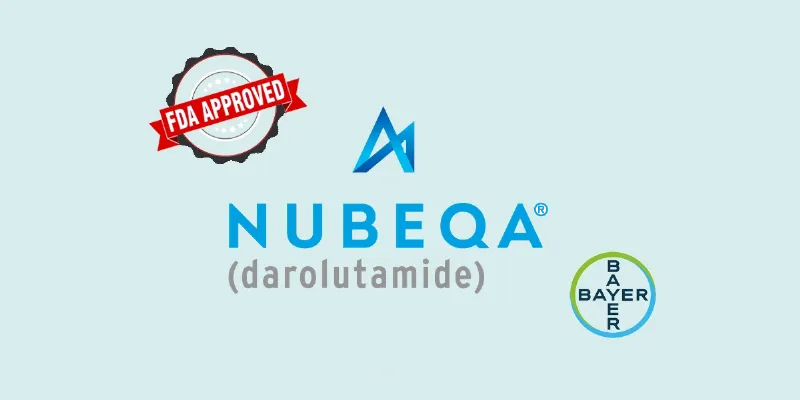FDA Approves Darolutamide Plus ADT for mCS Prostate Cancer

The FDA approved darolutamide (Nubeqa®) for metastatic castration-sensitive prostate cancer, based on the Phase III ARANOTE trial, which showed a 46% reduction in radiographic progression or death. Median rPFS was not reached in the darolutamide arm, and adverse events were manageable.
Bayer announced that the U.S. Food and Drug Administration (FDA) has approved its oral androgen receptor inhibitor, darolutamide (Nubeqa®), for adult patients with metastatic castration-sensitive prostate cancer (mCSPC). This milestone follows the pivotal Phase III ARANOTE trial, which demonstrated a substantial reduction in radiographic progression or death with the addition of darolutamide to standard androgen deprivation therapy (ADT).
A New Treatment Paradigm for mCSPC
Darolutamide, an oral androgen receptor inhibitor (ARi) with a unique chemical structure, is now the first and only ARi approved in the U.S. for the treatment of mCSPC both with and without chemotherapy. This decision expands on its existing indications, including non-metastatic castration-resistant prostate cancer (nmCRPC) and mCSPC in combination with docetaxel.
The ARANOTE trial (NCT02799602), a randomized, double-blind, placebo-controlled study, enrolled 669 men with mCSPC who received either darolutamide (600 mg twice daily) or placebo, alongside ADT. A notable feature of this study was the inclusion of patients regardless of prior chemotherapy exposure, reflecting a broad, real-world population.
“'Clinical data from the ARANOTE trial supporting this new regimen showed that NUBEQA plus ADT demonstrated powerful efficacy in men with mCSPC. Today’s approval further expands physicians’ options for using NUBEQA with and without docetaxel in this setting, providing a potential new choice for patients,” said Dr. Fred Saad, principal investigator of the ARANOTE trial.
Robust Efficacy Results
The primary endpoint of the ARANOTE trial, radiographic progression-free survival (rPFS), was met with a significant 46% reduction in the risk of radiographic progression or death in the darolutamide arm compared to placebo plus ADT (hazard ratio [HR] 0.54; 95% CI: 0.41-0.71; p<0.0001). Median rPFS was not reached in the darolutamide group, while it was 25 months (95% CI: 19 to not reached) in the placebo arm.
Importantly, these benefits were consistent across prespecified subgroups. In patients with high-volume disease, darolutamide plus ADT achieved a 40% reduction in risk (HR 0.60; 95% CI: 0.44-0.80), and an even greater 70% reduction (HR 0.30; 95% CI: 0.15-0.60) was observed in those with low-volume disease.
Although overall survival (OS) did not reach statistical significance at the final analysis (HR 0.78; 95% CI: 0.58-1.05), the trend favored darolutamide, suggesting potential for long-term survival benefits with extended follow-up.
“This approval, which is supported by strong clinical data, reaffirms NUBEQA as an important therapy for men with prostate cancer and underscores our commitment to delivering meaningful outcomes for patients and their families,” said Christine Roth, Executive Vice President at Bayer.
Safety Profile
Consistent with its established safety data, darolutamide plus ADT was well tolerated. Serious adverse event (SAE) rates were similar between the darolutamide and placebo arms (24% each). Discontinuation due to treatment-emergent adverse events was lower in the darolutamide group (6%) than in the placebo group (9%).
The prescribing information for darolutamide highlights known risks, including ischemic heart disease, seizures, and embryo-fetal toxicity. As with previous indications, the recommended dose is 600 mg twice daily with food, continued until disease progression or unacceptable toxicity.
Clinical and Public Health Implications
Prostate cancer remains the second most common cancer in men worldwide and the fifth leading cause of cancer-related mortality in men. In 2020 alone, approximately 1.4 million men were diagnosed globally, with a projected increase to 2.9 million by 2040. The expanded approval of darolutamide provides a meaningful new option for men with mCSPC, a population with historically limited therapeutic avenues.
About the ARANOTE Trial
The ARANOTE trial (NCT04736199) is a Phase III, randomized, double-blind, placebo-controlled trial designed to assess the efficacy and safety of NUBEQA in combination with standard ADT in patients with mCSPC. A total of 669 patients were randomized 2:1 to receive either 600 mg of NUBEQA (n=446) or placebo (n=223) twice daily in addition to ADT. The primary endpoint of the ARANOTE trial was rPFS, measured as the time from randomization to the first documented radiological disease progression or death due to any cause, whichever occurs first. The results from this pivotal Phase III ARANOTE trial demonstrated a statistically significant improvement in rPFS with a 46% reduction in the risk of radiologic progression or death (HR 0.54; 95% CI: 0.41-0.71; P<0.0001) compared to placebo plus ADT.











Comments
No Comments Yet!